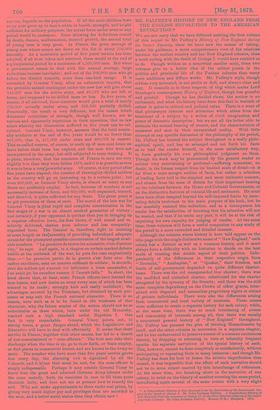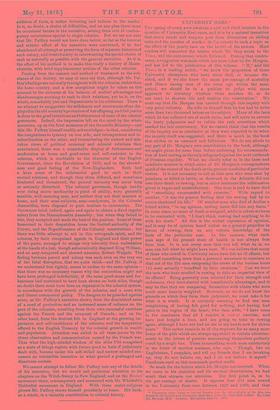MR. PALFREY'S HISTORY OF NEW ENGLAND FROM THE ENGLISH REVOLUTION
TO THE AMERICAN REVOLUTION.*
• A Compendious History of New England from the Revolution of the Seventeenth Cen- tury to the Death of George I. By John Gorham Palfrey. A Compendious History of New England from the Accession of George II. to the First General Congress of the Anglo- American Colonies. By John Gorham Palfrey. Boston (U.S.): Shepard. 1873. WE are not sorry that we have deferred noticing the first volume of this sequel to Mr. Palfrey's History of New England during the Stuart Dynasty, since we have now the means of taking, under his guidance, a more comprehensive view of the relations between the mother country and her New England colonies, than a work ending with the death of George I. would have enabled us to do. Though written on a somewhat smaller scale, these two give us a better idea of the salient points in the- politics and provincial life of the Puritan colonies than many more ambitious and diffuse works. Mr. Palfrey's style, though seldom very animated, is not prolix or dull, and always clear and easy. It reminds us in these respects of th4 which marks Lord. Stanhope's contemporary History of England, though less graceful and pointed. Though he has decided views, the author is no- enthusiast, and what his history loses from this fact in warmth of colour it gains in critical and judicial value. There is a want of that picturesque interest and attraction which arises from the treatment of a subject by a writer of vivid imagination and power of dramatic description ; but we are all the better able to- estimate the mutual bearing of events, and the characteristics of measures and men in their -unvarnished reality. With little attempt at any specific discussion of the philosophy of his period, Mr. Palfrey has treated the subject throughout in a really philo- sophical spirit, and has so arranged and set forth his facts as to lead the reader himself, in the most satisfactory way, to form gradually his own philosophical judgment on them. - Though his work may be pronounced by the general reader as- neither very entertaining or profound—suffering somewhat, no doubt, in the former respect from its limited scale of detail—it fe far from a mere meagre outline of facts, but rather a selection of leading facts told in the simplest and most authentic manner, and chosen from the mass of details for their important bearing on the relations between the Home and Colonial Governments, or- on the distinctive features of colonial life and sentiment. He must have been often tempted beyond his self-imposed limits by inter- esting details irrelevant to the main purpose of his book, but he- has manfully resisted this seduction, and as a consequence his reader has the satisfaction of knowing that his attention will not be wasted, and that if he omits any part, it will be at the risk of impairing his own capacity for judging of results. At the same time, these volumes will form a useful companion to any study of the period in a more extended and detailed manner.
Although the colonies whose history is here told appear on the title-page with the single distinctive name of "New England," each colony has a distinct as well as a common history, and it must always form a difficulty with an historian to decide on the beat mode of treating this double aspect of their politics. Inde- pendently of the differences in their respective origin frora " Brownist," "Anabaptist," or "Quaker," their freedom and limits of self-government depended on quite different charter- bases. There was the old unsuperseded free charter ; there was the modified and curtailed charter, substituted for the charter abrogated by the tyranny of the Stuarts ; and there was the still. more complete dependency on the Crown of other grants, inter- mixed with disputed and anomalous proprietary rights or claims of private individuals. There were also the differences arising from commercial and local variety of interests. These causes were sufficient to create a separate history for each colony, while, at the same time, there was so much interlacing of events and community of interests among all, that there was usually a concurrent general history of "New England" throughout.. Mr. Palfrey has pursued the plan of treating Massachusetts by itself, and the other colonies in succession in a separate chapter, and he has endeavoured to preserve a sense of a common continuous history, by dropping or resuming in turn at tolerably frequent epochs his separate namtives of the special history of each. This, however, cannot be done completely or satisfactorily, without anticipating or repeating facts in many instances ; and though Mr.. Palfrey has done his best to lessen the artistic imperfection thus caused, it was impossible that the effect of each narrative should, not be to some extent marred by this interchange of references. At the same time, the breaking short in the narrative of one colony, to enter on the history of another covering the same period, introducing again several of the same events with a very slight,
addition of facts, is rather irritating and tedious to the reader. It is, no doubt, a choice of difficulties, and on any plan there must be occasional breaks in the narrative, arising from sets of contem- porary occurrences special to single colonies. But we are not sure that Mr. Palfrey would not have done better, so far as the interest and artistic effect of his narrative were concerned, if he had abandoned all attempt at preserving the form of separate histories of each colony, and trusted solely to interweaving the special events of each as naturally as possible with the general narrative. As it is, the effect of his method is to make this really a history of Massa- chusetts, with brief supplementary notices of the other colonies.
Passing from the manner and method of treatment to the sub- stance of the history, we may at once say that, although Mr. Pal- frey's feelings are naturally throughout with the colonies, rather than the home country, and a few exceptions might be taken on this account to the evenness of his balance of mutual advantages and disadvantages accruing to each in their relations, yet he is, on the whole, remarkably just and dispassionate in his criticisms. There is no attempt to exaggerate the selfishness and narrowness often dis- played in the old country's protection of her offspring, and full justice is done to the good intentions and forbearance of some of the colonial governors. Indeed, the impression left on the mind by the whole narrative, up to the fatal measures of the Grenville Ministry—and this Mr. Palfrey himself readily acknowledges—is that, considering the temptations to tyranny on one side, and intemperance and in- subordination on the other, and remembering the narrow and mis- taken views of political economy and colonial relations then entertained, there was a remarkable display of forbearance and moderation at home and good-sense and self-restraint in the colonies, which is creditable to the character of the English Government, since the Revolution of 1689, and to the shrewd- ness and good feeling of the New-Englanders. Both had a keen sense of the substantial good to each in their mutual relations, and though they often differed, and sometimes blustered and threatened, the general harmony was never long or seriously disturbed. The colonial governors, though hardly ever rising above mediocrity in point of ability, were generally sensible, well-meaning men, and neither they nor their masters at home, and their semi-subjects, semi-coadjutors, in the Colonial Assemblies, were disposed to push matters to extremities. The Governors tried, indeed, again and again to obtain a fixed regular salary from the Massachusetts Assembly ; but when they failed in this, they accepted and made the best of the position. Some of them bemoaned in their despatches home the limited authority of the Crown, and the Republicanism of the Colonial constitutions ; but there was little attempt to act in this retrograde spirit, and the colonies, by their recognised agents in England and their power of the purse, managed to escape very tolerably from molestation at the hands of a just, though autocratically disposed King William, and an easy-tempered and shrewd minister, Robert Walpole. The feeling between parent and colony was such even on the very eve of the fatal disruption, that we quite think—and Mr. Palfrey, if we understand him rightly, seems to incline to the same opinion— that there was no necessary reason why the connection might not have been prolonged indefinitely, if the same good-sense and for- bearance had continued to have been shown on both aides, though no doubt there must have been an expansion in the colonial system, in accordance with the growth of the colonies, and a more wise and liberal commercial policy. The dangers to be guarded against arose, as Mr. Palfrey's narrative shows, from the diminished sense of a need of protection and an increased sense of reliance on the part of the colonists, resulting from their own successful exertions against the French and the conquest of Canada ; and on the other, hand, from the distrust felt in England at the growing im- portance and self-confidence of the colonies, and the temptation offered to the English Treasury by the colonial growth in wealth and population. Attention was called to all these points by the closer observation and communication caused by the French war. Thus what the high-minded wisdom of the elder Pitt recognised as a state of things replete with future good to both if judiciously dealt with, became under his self-willed and narrow-minded suc- cessors an irresistible incentive to what proved a prolonged and disastrous contest.
We cannot attempt to follow Mr. Palfrey into any of the details of his narrative, but we would call particular attention to his chapters on the Witch-frenzy in New England, and on the Revival movement there, contemporary and connected with Mr. 1Vhitfield's Methodist movement in England. With these social-religious phases Mr. Palfrey shows himself peculiarly at home. His book, as a whole, is a valuable contribution to colonial history.



































 Previous page
Previous page